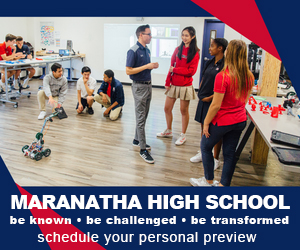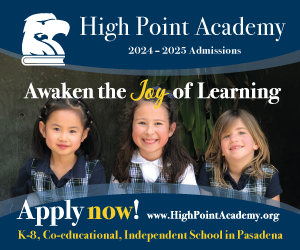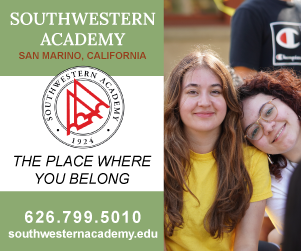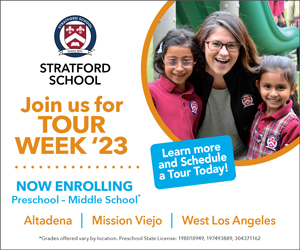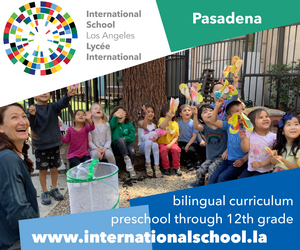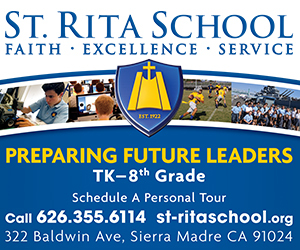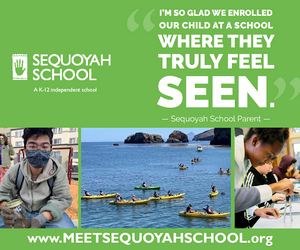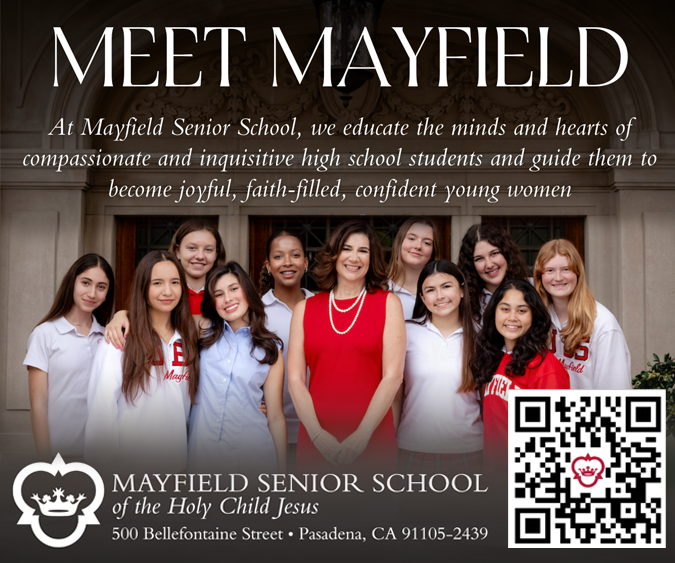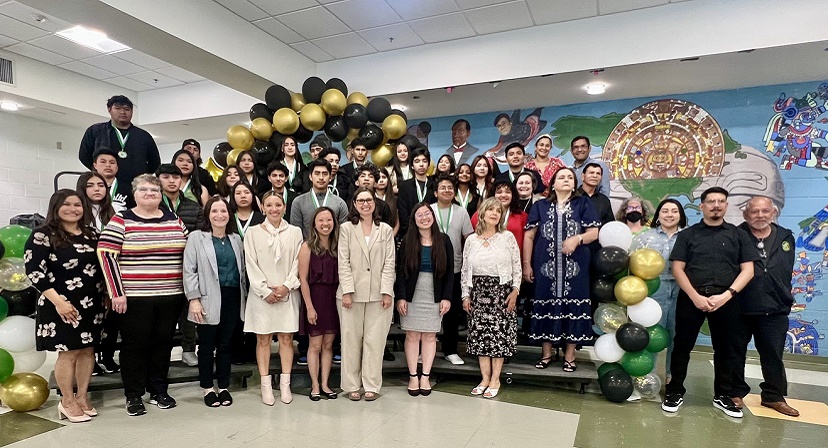Future Proofing Your Child’s Career
Why Waldorf is an Education for the 21st Century
 Schools around the world face a challenge: how to educate and prepare their students for an uncertain future. A future in which technology is advancing rapidly and many jobs are being replaced by robots and artificial intelligence (AI). How can parents and teachers “future-proof” their child’s education? What skills will be needed to meet the challenges of the 21st century? A key aspect of the future of work is understanding which skills and qualities can’t be replicated by technology, and the most foundational is the ability to adapt and thrive in whatever situation arises. These qualities, known in the business world as the Adaptability Quotient, include flexibility, creativity, showing initiative, critical thinking, and emotional intelligence, and many top companies already see these skills as essential in the workplace. At Pasadena Waldorf School, these skills are at the heart of our curriculum, and our teachers focus on developing and fostering these qualities in our students to prepare them to succeed in higher education, in the workplace, and in whichever life path they choose to pursue after graduation as happy, healthy, thriving adults.
Schools around the world face a challenge: how to educate and prepare their students for an uncertain future. A future in which technology is advancing rapidly and many jobs are being replaced by robots and artificial intelligence (AI). How can parents and teachers “future-proof” their child’s education? What skills will be needed to meet the challenges of the 21st century? A key aspect of the future of work is understanding which skills and qualities can’t be replicated by technology, and the most foundational is the ability to adapt and thrive in whatever situation arises. These qualities, known in the business world as the Adaptability Quotient, include flexibility, creativity, showing initiative, critical thinking, and emotional intelligence, and many top companies already see these skills as essential in the workplace. At Pasadena Waldorf School, these skills are at the heart of our curriculum, and our teachers focus on developing and fostering these qualities in our students to prepare them to succeed in higher education, in the workplace, and in whichever life path they choose to pursue after graduation as happy, healthy, thriving adults.
Cultivating Creativity and Imagination
 True creativity and imagination cannot be imitated with even the most advanced technology. AI can only work with the information it has been given and cannot come up with truly original ideas, so here at Pasadena Waldorf School a core part of our curriculum is fostering creative and imaginative skills in the classroom. It begins in our Early Childhood classrooms with an emphasis on natural and multiuse, open-ended play materials which encourage creativity and imaginative play. Our teachers use storytelling throughout our curriculum to allow the students to use their imagination to bring the stories to life. We also teach students through creative arts, including drawing, painting, fiber arts, woodwork, theater, and music.
True creativity and imagination cannot be imitated with even the most advanced technology. AI can only work with the information it has been given and cannot come up with truly original ideas, so here at Pasadena Waldorf School a core part of our curriculum is fostering creative and imaginative skills in the classroom. It begins in our Early Childhood classrooms with an emphasis on natural and multiuse, open-ended play materials which encourage creativity and imaginative play. Our teachers use storytelling throughout our curriculum to allow the students to use their imagination to bring the stories to life. We also teach students through creative arts, including drawing, painting, fiber arts, woodwork, theater, and music.
Each student has artistic activity as part of their school experience, not as an extra, but as a critical part of their education, and as a teaching tool to help deepen their understanding of other subjects. The arts provide important opportunities for students to fail, learn from those failures, and then persevere in the face of those challenges. The arts help develop self-confidence as students see their progress in acquiring new skills and take something from a concept in their imagination to actualization in clay, paint, or wood. By nurturing their imagination and creativity, our teachers help students acquire abilities that will be vital to their future careers, including problem-solving, being able to think outside the box, being solution-focused in the face of challenges, using critical thinking skills, and having the desire, confidence, and skillsets to create and innovate.
Systems thinking: seeing the bigger picture
Systems thinking is a way of looking at a complex situation as a whole. It involves being able to see the big picture as well as the relationships between the parts involved. This is very important when trying to find practical solutions to large problems, whether it is a complex supply chain issue at a business or the impact of climate change on a particular ecosystem. As our world and its challenges become ever more complex, we increasingly need people who can think about problems in holistic and interdisciplinary ways.
While AI can perform complex analyses of multiple sets of data much more quickly and efficiently than humans can, you need a talented human being to pose the right questions for analysis and to translate that analysis into meaningful and applicable insights for solving the problems.
 Pasadena Waldorf teachers recognize that a fully human approach is vital for working in the modern world, so they prepare their students by engaging them in interdisciplinary projects which challenge them to analyze complex situations, make accurate predictions, approach problems from different angles, and recognize the pros and cons of a variety of possible solutions to make an informed decision. That starts with our approach to math and science. Early on, we emphasize practical and applied approaches to these subjects, which in math can range from slicing pie as a way to understand fractions in grade school or designing board games to understand probability math in High School.
Pasadena Waldorf teachers recognize that a fully human approach is vital for working in the modern world, so they prepare their students by engaging them in interdisciplinary projects which challenge them to analyze complex situations, make accurate predictions, approach problems from different angles, and recognize the pros and cons of a variety of possible solutions to make an informed decision. That starts with our approach to math and science. Early on, we emphasize practical and applied approaches to these subjects, which in math can range from slicing pie as a way to understand fractions in grade school or designing board games to understand probability math in High School.
Our approach to science starts out in nature in the early grades, where outdoor play and exploration help develop curiosity about the natural world. This forms the foundation for science concepts later. We have a phenomenological approach to teaching science which means that instead of starting with memorizing scientific laws and then observing them later in nature or in the lab, we start in the lab or outdoors and students discover scientific laws through observation and experimentation. This approach replaces rote memorization of science concepts with the opportunity for students to think like scientists. That allows them to apply rigorous scientific thinking and the scientific method to any problem they are faced with.
Hands-on, project-based, and nature-based science curriculum challenges students to think about and interact with complex systems, from weather patterns to animal habitats and from agriculture to local geology so that they are prepared to tackle the complex problems that arise in life and work. These skills prepare our students to be creative and compassionate adults whose unique experiences and talents make them stand out in the application process for higher education and employment.
Emotional intelligence
 One area of the world of work where technology falls short is the human aspects of conversation and interaction. For example, while it is fine to book an appointment via a website or an online chatbot, if you are experiencing a personal problem and need to talk to somebody, or there is a complex social issue in the workplace, no technology could have a full understanding of the situation or be able to respond with genuine compassion. We therefore encourage our students to learn empathy, kindness, listening skills, and patience. Starting in Early Childhood, our play-based approach strengthens important social and emotional skills and sets the children on a path to healthy social development. Our Healthy Social Life Program is at the heart of the Waldorf Education experience and teaches all students to have a growing awareness of their emotions, to be able to express and manage their feelings, as well as being aware of others’ emotions and to relate to them. Social inclusion, peer counseling, and community service are core elements of the program. The ability to work well with others, to listen and understand the needs of others, to be able to communicate your own ideas and needs, and to navigate and resolve conflict are hugely important to success in the workplace and beyond.
One area of the world of work where technology falls short is the human aspects of conversation and interaction. For example, while it is fine to book an appointment via a website or an online chatbot, if you are experiencing a personal problem and need to talk to somebody, or there is a complex social issue in the workplace, no technology could have a full understanding of the situation or be able to respond with genuine compassion. We therefore encourage our students to learn empathy, kindness, listening skills, and patience. Starting in Early Childhood, our play-based approach strengthens important social and emotional skills and sets the children on a path to healthy social development. Our Healthy Social Life Program is at the heart of the Waldorf Education experience and teaches all students to have a growing awareness of their emotions, to be able to express and manage their feelings, as well as being aware of others’ emotions and to relate to them. Social inclusion, peer counseling, and community service are core elements of the program. The ability to work well with others, to listen and understand the needs of others, to be able to communicate your own ideas and needs, and to navigate and resolve conflict are hugely important to success in the workplace and beyond.
Cultural Competency
 Thanks to technology and the ease of travel, businesses now have the option to invite people from all over the world to work for them, and as a result, it has become imperative to understand different cultures and be able to work with people from many different backgrounds. Our teachers at Pasadena Waldorf School recognize the importance of cultivating qualities of open-mindedness, an enthusiasm for appreciating different perspectives in decision-making processes, and being able to bring people together in a respectful and compassionate way. These qualities are developed and fostered throughout the school, for example by learning two world languages, celebrating festivals from different cultures, and learning about world religions and world history throughout our curriculum. In addition, students in the Tenth and Eleventh Grades can apply to spend a quarter abroad for the Exchange Program. It is a fantastic opportunity to experience being fully immersed in everyday life in another culture. These cultural competency skills make Waldorf graduates uniquely qualified to work and thrive in a globalized future.
Thanks to technology and the ease of travel, businesses now have the option to invite people from all over the world to work for them, and as a result, it has become imperative to understand different cultures and be able to work with people from many different backgrounds. Our teachers at Pasadena Waldorf School recognize the importance of cultivating qualities of open-mindedness, an enthusiasm for appreciating different perspectives in decision-making processes, and being able to bring people together in a respectful and compassionate way. These qualities are developed and fostered throughout the school, for example by learning two world languages, celebrating festivals from different cultures, and learning about world religions and world history throughout our curriculum. In addition, students in the Tenth and Eleventh Grades can apply to spend a quarter abroad for the Exchange Program. It is a fantastic opportunity to experience being fully immersed in everyday life in another culture. These cultural competency skills make Waldorf graduates uniquely qualified to work and thrive in a globalized future.
Preparing to step into the future

The future is uncertain, and the rate of advances and development in technology is increasing rapidly. Waldorf Education is therefore designed to be a global approach that focuses on “educating students to learn to work together, across cultures, to solve complex problems that may not have simple solutions.” By the time our students graduate, they are equipped with valuable capacities and much-needed skills that will enable them to succeed in their chosen careers and to be able to confidently address future challenges, even those that we cannot even begin to imagine. No matter how far technology advances in the next decades, our graduates’ holistic and human-centered approach will serve them well in whatever career they decide to pursue.
Pasadena Waldorf School, 209 E. Mariposa Street, Altadena, (626) 794-9564 or visit https://www.pasadenawaldorf.org/.





